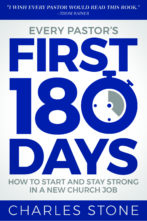Discern the Appropriate Pace and Degree of Organizational Change
As I mentioned earlier, the brain can only process a limited amount of change at once. Because of that, you’ll want to carefully think about pace—how fast or slow you bring change—and degree—how much change you want to effect.
In one church where I was the lead pastor, I approached organizational change too slowly. A few leaders shared their frustration because they thought I was dragging my feet. In my mind, I was setting the stage for change. But in retrospect, I failed to communicate my thinking, which led them to conclude I was dragging my feet. On the other hand, after I attended the Willow Creek conference that I mentioned earlier, I tried to bring too much organizational change too soon. Neff and Citrin capture the importance of appropriate pace and degree with these words. “Just remember that too much change can break the culture—or more likely destroy the change-maker. You have to pace yourself and continually assess the tolerance of the organization.”
The expectations you set for the people play a role here as well. Since uncertainty can breed fear and resistance, the more clearly you set expectations, the less uncertainty will work against you. Don’t overpromise nor underpromise. Ideally, your church or ministry will see that the benefits of the organizational change will exceed their expectations. When that happens, people become even more willing to embrace future changes. Dr. David Rock, a noted expert on neuroscience and leadership, wrote, “What you expect is what you experience.” In other words, expectations can profoundly influence people’s experiences.
In Chapter 9, Establish Trust of my book Every Pastor’s First 180 Days, I explain why gaining some quick wins is crucial. Early on, it’s important that you make changes that will enhance your credibility and address burning issues. But doing it too fast or too slow can hinder effective organizational change, as can trying to change too much or not enough. Although the church or ministry will expect you to bring organizational change, be careful about pushing it until you know the culture, can bring your leaders onboard, and have created a clear change plan. You want to show visible movement during your first six months without wrecking things or losing support or credibility.
This article is excerpted from Charles Stone’s new book Every Pastor’s First 180 Days: How to Start and Stay Strong in a New Church Job.





